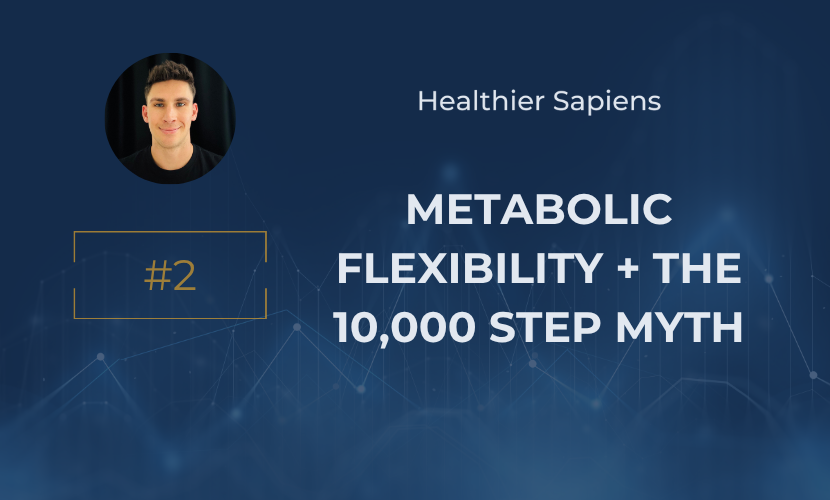Metabolic Flexibility Explained
Why 7,000 Steps and 4-Hour Fasts Matter More Than You Think
Tom Mitkus
10/25/20254 min read


My clients often ask me the same question about three days into their program.
"Why do I feel so tired?"
They're worried. They think something's wrong. Maybe the program isn't working. Maybe they're doing it incorrectly.
I tell them the same thing every time: "This is exactly what's supposed to happen."
Here's what's going on.
Your body is relearning how to burn fat. For years, maybe decades, it's been running on a constant stream of glucose.
Now it's switching gears. That transition takes time. Usually 3 to 4 days.
Then something remarkable happens.
The energy comes flooding back. Stable, abundant energy that lasts all day. No more 3pm crashes. No more desperate need for snacks between meals.
That's metabolic flexibility returning.
And with holiday parties around the corner, unpredictable schedules, and the weather making outdoor activity harder, you need to know if your metabolism can adapt. Because metabolic flexibility isn't just about energy levels. It's about your long-term health.
In this post, I'm going to show you exactly what metabolic flexibility is, why it matters, how to test yours in just 4 hours, and what recent research reveals about the simple habits that protect your health.
Let's start with the basics.
💡 This Week's Insight
Metabolic flexibility is your body's ability to switch between burning fat and burning glucose based on what's available.
Think of it like this: A metabolically flexible person can burn fat when they're fasting or between meals, then quickly switch to burning glucose after eating. The transition happens fast and smooth. [1, 2]
Here's why it matters.
When you're metabolically inflexible, your body keeps getting a constant stream of fuel. Your mitochondria get overwhelmed. This creates reactive oxygen species, leading to cell damage, insulin resistance, and ultimately, disease. [3]
Sound dramatic? It's not.
Research shows that people with obesity and type 2 diabetes have lost this flexibility. Their muscles don't switch properly between fats and carbs. They stay stuck, burning the wrong fuel at the wrong time.
The good news? Exercise, intermittent fasting, and caloric restriction can restore metabolic flexibility.
That's exactly what we do in my program.
Most of my clients experience that brief 3 to 4 day adjustment period I mentioned. Lower energy. Maybe some brain fog. Then boom. Abundant, stable energy all day long.
That's metabolic flexibility coming back online.
⚡ Quick Win
Test your metabolic flexibility this weekend.
Pay attention between meals. Can you go 4 to 5 hours without eating? Or do you crash hard and need a snack?
Wake up tomorrow. Don't eat immediately. See how you feel after 2 hours. A metabolically flexible person feels fine. Clear-headed. Good energy.
After your next workout, track your recovery. Do you feel energised? Or do you crash and need food immediately?
The more flexible your metabolism, the better you handle these gaps between eating.
If you're constantly hungry, constantly tired, or crashing after exercise? Your metabolism is stuck in one gear.
Time to fix it.
🔬 Research Spotlight
Let's talk about the 10,000 steps myth.
You've heard it a million times. "Get your 10,000 steps." But here's something most people don't know: that number came from a 1965 Japanese marketing campaign for a pedometer called the "manpo-kei." It literally means "10,000 steps meter."
Zero science behind it.
Now we have the science. And it's fascinating.
A massive new meta-analysis just came out in The Lancet. They analysed 31 studies with 293,562 adults. The researchers wanted to know: how many steps do you actually need?
Here's what they found.
Compared to 2,000 steps per day, walking 7,000 steps was associated with a 47% lower risk of dying from any cause, a 25% lower risk of cardiovascular disease, a 37% lower risk of cancer death, a 14% lower risk of type 2 diabetes, a 38% lower risk of dementia, and a 22% lower risk of depression.
Seven thousand steps. Not ten thousand.
Even better: increasing from 3,000 to 7,000 steps showed huge improvements across almost every outcome. The jump from sedentary to moderately active gave the biggest bang for your buck.
What about going higher? Yes, more steps (up to 12,000) continued to reduce risk for some conditions. But the benefits plateaued around 4,800 to 8,800 steps for most outcomes.
The big picture: 7,000 steps captures most of the health benefits. That's roughly 70 minutes of moderate-pace walking.
Much more achievable than 10,000. Especially when you're juggling work, family, and trying to maintain some semblance of sanity during the holidays.
If you want to lose fat faster, aim for as many as you can.
I tell my executive clients: park farther away. Take the stairs. Walk during phone calls. It adds up faster than you think.
🔗 Worth Your Time
If you want to dive deep into metabolic flexibility, read this: "Metabolic Flexibility in Health and Disease" published in Cell Metabolism.
Fair warning. It's academic. Dense. But worth it if you're serious about understanding your metabolism.
The summary:
Metabolic flexibility is your body's ability to adapt to changes in metabolic demand. It's especially important in the transition from fasting to feeding and from rest to exercise.
The paper explains how obesity and type 2 diabetes are marked by metabolic inflexibility. In healthy people, skeletal muscle burns fat during fasting and switches to glucose after eating. In obese and diabetic individuals, this switch doesn't happen properly.
Exercise training can improve metabolic flexibility. So can calorie restriction and weight loss. Both interventions help restore your body's ability to use the right fuel at the right time.
The researchers go deep into the molecular mechanisms. Mitochondria. Enzyme regulation. Transcription factors. If you're into science, this paper delivers.
Bottom line: your metabolism should be flexible, not rigid. When it's rigid, disease follows.
Here's the final thing about metabolic health.
It's not about perfection. It's about building a body that can adapt. A body that handles stress. A body that switches between fuel sources without crashing.
With holiday parties coming up and the weather getting worse, you need that flexibility more than ever.
Try the Quick Win this weekend. Notice how you feel between meals. That awareness is the first step.

